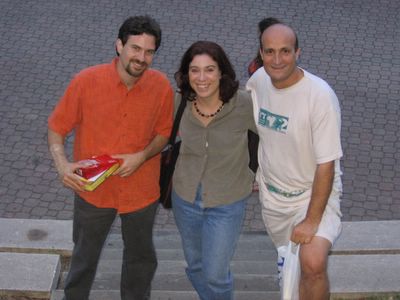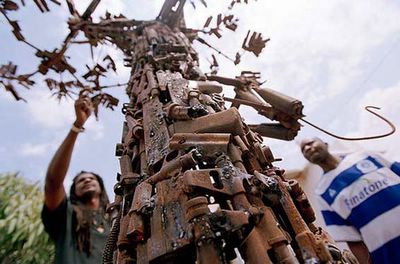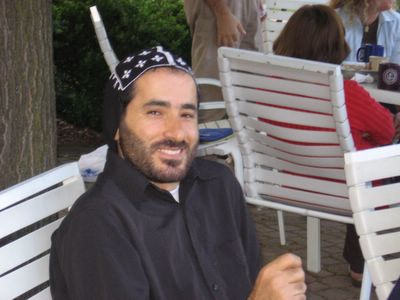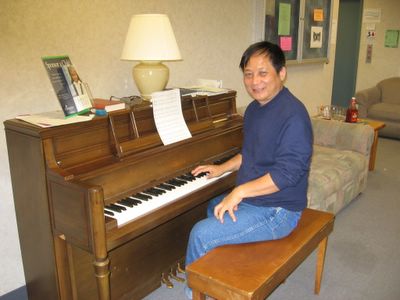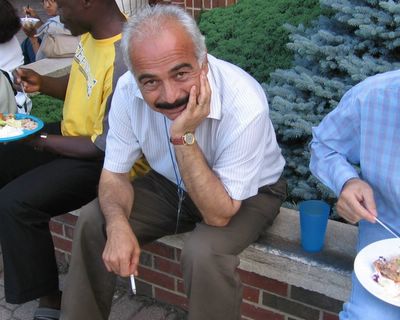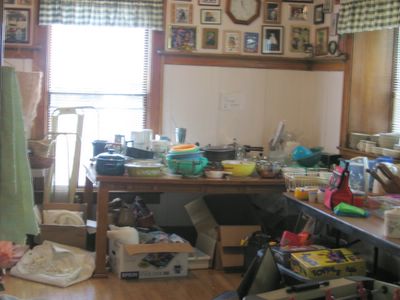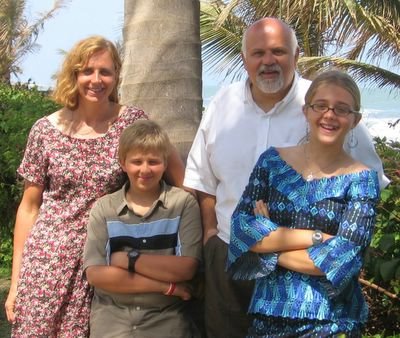Thursday, June 23, 2005
I Drove All Night To Get To You
It was a long and winding road. After rushed goodbyes, I sped out of the Eastern Mennonite University campus at 3:30pm Tuesday the 21st, about fifteen minutes after my last class ended.
Heroes
It was like nothing else I have ever experienced. It was a gathering of practical idealists, men and women who every day make tangible the loftiest dreams we hold. Some work in the most horrific places on the planet, where injustice and oppression is merely background noise for worst humans can do to each other. Others work in relative peace, where severe hunger and poverty are the violence makers. There is no question about why it needs to be done, or timing, or whether it makes a difference. It is simply a given that the work must be done. They bring sanity and compassion to a world that has lost its mind and heart.
Below are just a few shots of the greatest heroes I have ever met.
Below are just a few shots of the greatest heroes I have ever met.

Augustine from Pakistan, with Manohar from Nepal. Manohar (on the right) liked to buy things. Augustine, a community development worker, fed his family on $140.00 a month. Augustine's family cannot afford a chicken to eat but once a month, yet he works tirelessly to make his region more stable. He was here on a scholarship, and wanted to go with me whenever I took others to buy things. He could not afford to buy himself, but he liked the company just the same. So did I.

Gary up front, an American who worked in Bosnia, to his left Mahnaz from Pakistan doing women's right work in Afganistan; Amany, an Egyptian doctor working at the American hospital in Tanta, Egypt; Stan, a therapist who's been all over; Angela, an American who's worked extensively in Liberia and is jealous of me for going there; and Linda and Michele, two Irish ladies who have lost men to the troubles in Belfast. I could write stories about each.
Saturday, June 18, 2005
Leaving SPI
Its Saturday morning in Harrisonburg Virginia, and I'm ready, very ready, to return to Grand Rapids. Being away from Renita and the kids at such a critical time of transistion and for such a long time has been a strain on us all. The experience here has been unforgettable, and I take away information, tools, and especially memories that will be a part of me for the rest of my life. But now my thoughts are with my family and the important work we need to do in the remaining month we have before we leave.
While I've been gone, Renita has been doing the incredidble amount of work it takes to sell a home and almost all household goods, talking with the CRWRC people about shots, visas, insurance, contracts, and at the same time assisting Restorers as it completes the transition to its new director. She is something else. And I miss her. So by this time, four days hence, I will be on the road to be reunited for our last month in Michigan, USA.
While I've been gone, Renita has been doing the incredidble amount of work it takes to sell a home and almost all household goods, talking with the CRWRC people about shots, visas, insurance, contracts, and at the same time assisting Restorers as it completes the transition to its new director. She is something else. And I miss her. So by this time, four days hence, I will be on the road to be reunited for our last month in Michigan, USA.
Thursday, June 16, 2005
The Fam Reunites in DC
Hey folks, Bob here. The family came to visit me in Virginia, so we spent a few days together in our nation's capital. Washington DC is a great city, and the new World War II memorial is touching and beautiful. We spent the first day and a half at museums, and the next day and a half at monuments, memorials and Arlington Cemetary. The last day and a half seemed to me to be much more meaningful. Memorials are symbolic in nature; they speak a language beyond words, and thus allow the observer to create his or her meaning.
As a man dedicated to justice and peacebuilding, I found the war memorials evoked a more complex reaction than they used to. On the one hand, these places honor men and women who sacrificed their lives for duty or love of country or other values they may have held dear. This aspect created a sober and reverent sense within me. On the other hand, these sites offer no challenge the systems and powers that asked men and women to "give their last full measure of devotion." Indeed, one incription on the WWII memorial states-- in caps-- "WE ARE DETERMINED THAT BEFORE THE SUN SETS ON THIS TERRIBLE STRUGGLE OUR FLAG WILL BE RECOGNIZED THROUGHOUT THE WORLD AS A SYMBOL OF FREEDOM ON THE ONE HAND AND OF OVERWHELMING FORCE ON THE OTHER."
This is why these men and women died in this "terrible" war? To show the entire world that our flag represents the strange bedfellows of freedom and overwhelming military power? I felt sadness and I admit some anger at the smallness of men that cause them to resort to war. These memorials honor the dead, and by design make no attempt to question whether the deaths were actually necessary. But as I walked past the Vietnam Veteran Memorial, and through the graves at Arlington, and tried to count the brass stars at the WWII memorial, I kept thinking to myself, "If conflicts someday can be transformed, and war can be shown for what it is-- an unnecessary evil-- what will these places come to mean then?"
Anyway, it was great to see Renita and the kids, but painful to watch them drive off for Grand Rapids. As I write, I only have seven more days before I get home and rejoin them for the final push berfore we leave for Liberia. Even though they were just here, I miss them terribly, and know this separation has taken a toll on us all.
As a man dedicated to justice and peacebuilding, I found the war memorials evoked a more complex reaction than they used to. On the one hand, these places honor men and women who sacrificed their lives for duty or love of country or other values they may have held dear. This aspect created a sober and reverent sense within me. On the other hand, these sites offer no challenge the systems and powers that asked men and women to "give their last full measure of devotion." Indeed, one incription on the WWII memorial states-- in caps-- "WE ARE DETERMINED THAT BEFORE THE SUN SETS ON THIS TERRIBLE STRUGGLE OUR FLAG WILL BE RECOGNIZED THROUGHOUT THE WORLD AS A SYMBOL OF FREEDOM ON THE ONE HAND AND OF OVERWHELMING FORCE ON THE OTHER."
This is why these men and women died in this "terrible" war? To show the entire world that our flag represents the strange bedfellows of freedom and overwhelming military power? I felt sadness and I admit some anger at the smallness of men that cause them to resort to war. These memorials honor the dead, and by design make no attempt to question whether the deaths were actually necessary. But as I walked past the Vietnam Veteran Memorial, and through the graves at Arlington, and tried to count the brass stars at the WWII memorial, I kept thinking to myself, "If conflicts someday can be transformed, and war can be shown for what it is-- an unnecessary evil-- what will these places come to mean then?"
Anyway, it was great to see Renita and the kids, but painful to watch them drive off for Grand Rapids. As I write, I only have seven more days before I get home and rejoin them for the final push berfore we leave for Liberia. Even though they were just here, I miss them terribly, and know this separation has taken a toll on us all.
Sunday, June 05, 2005
The SPI Coursework
Bob Reed here. I am almost done with my third of four course sessions at the Center for Justice and Peace Summer Peacebuilding Institute (SPI). The content in these courses, coupled with the out-of-class experiences with peacebuilders from all over the world, has been a learning experience beyond the power of words to express. Everyday brings new gifts, new understanding, new delights. It is a remarkable privilege to be in the company of heroes and prophets from all over the world spending themselves for peace and justice. We are students from Palestine, Israel, Syria, Iraq, Sri Lanka, India, Pakistan, Egypt, Northern Ireland, Rwanda, South Africa, Lesotho, Nepal, Colombia, Sudan, and dozens of other countries. We are Muslim, Jewish, Christian, Buddhist, atheist, agnostic, and even an Coptic monk. SPI has been perfect training for me as I ready myself for Liberia. Let me tell you a bit about the classes:
Session I-- Introduction to Conflict Transformation
Really, the course material was paradigm shattering. The entire conflict transformation approach was at once revelatory and novel, yet at the same time familiar and easy to embrace. It is not so much about technique or modality as it is a philosophy of being. I'd call it elegant if it were not for all the horror and chaos it lives in. The course normalized the concept of conflict and introduced me to a way of framing conflict, identifying underlying issues, and working with the principals to transform conflict into something new and better than what existed before. The instructor, David Hooker facilitated with grace, humor, and poise that can only come from doing this stuff in some of the toughest venues in the world.
Session II-- Designing Learner-Centered Training for Conflict Transformation
Just when I thought David Hooker could not be topped, I met Robb Davis. Completely different that David, Robb is another world-class instructor. The course content is the "dialogue education" approach from Jane Vella, founder of Global Learning Partners. I did not realize how much I could learn about teaching, but this was beyond all expectations. Dialogue education allows an abstract and intuitive guy like me to identify and organize the specifics of what I know. It will lay a path for me to do analysis to serve Liberians according to how they frame their needs, using resources they bring to the table. The approach will enable me to clearly articulate what I want students and trainees to do with the very specific content they are looking to learn. I have not worked as hard as I worked in this class in the last twenty years.
Session III-- Trauma and trauma Healing
Another important and relevant class. What it has most powerfully offered me is an articulation of what I have been thinking recently, namely that trauma, especially in contexts where entire societies have been traumatized, is simply outside the scope of traditional talk therapy to provide adequate healing. Because trauma is a whole mind, body and spirit experience, it is often completely beyond words to describe or recount. Symbolic language is often the most satisfying way a group or individual in deep trauma address and communicate the meaning of the events. I am receiving a steady stream of techniques and approaches to use: Mandalas, theatre, Haiku, human sculpting, symbolizing, memorializing. I'm also becoming acquainted with the language of restorative justice, which looks to forgiveness, restitution and relationship healing instead of retribution, blaming and punishment.
Session IV-- Peacebuilding for Traumatized Societies
Taught by Barry Hart, a man who has worked in Liberia, this course promises to be the perfect capstone to a remarkable training. It does not begin for another week, but already I am looking forward to it. Everyone I've talked to says its an outstanding course.
Each of these courses brought something new and unique to my training. Conflict Transformation, Curriculum Development, Trauma Healing, and Peacebuilding in a Traumatized Society-- these are exactly what I need for what I'll be doing, and I could not more pleased. Add to that the out-of-class relationships, and this place is indescribably rich and delightful. If in-class nourishes the mind and spirit, out of class feeds the heart and soul.
I wish you all could share this experiment in international peacebuilding.
Session I-- Introduction to Conflict Transformation
Really, the course material was paradigm shattering. The entire conflict transformation approach was at once revelatory and novel, yet at the same time familiar and easy to embrace. It is not so much about technique or modality as it is a philosophy of being. I'd call it elegant if it were not for all the horror and chaos it lives in. The course normalized the concept of conflict and introduced me to a way of framing conflict, identifying underlying issues, and working with the principals to transform conflict into something new and better than what existed before. The instructor, David Hooker facilitated with grace, humor, and poise that can only come from doing this stuff in some of the toughest venues in the world.
Session II-- Designing Learner-Centered Training for Conflict Transformation
Just when I thought David Hooker could not be topped, I met Robb Davis. Completely different that David, Robb is another world-class instructor. The course content is the "dialogue education" approach from Jane Vella, founder of Global Learning Partners. I did not realize how much I could learn about teaching, but this was beyond all expectations. Dialogue education allows an abstract and intuitive guy like me to identify and organize the specifics of what I know. It will lay a path for me to do analysis to serve Liberians according to how they frame their needs, using resources they bring to the table. The approach will enable me to clearly articulate what I want students and trainees to do with the very specific content they are looking to learn. I have not worked as hard as I worked in this class in the last twenty years.
Session III-- Trauma and trauma Healing
Another important and relevant class. What it has most powerfully offered me is an articulation of what I have been thinking recently, namely that trauma, especially in contexts where entire societies have been traumatized, is simply outside the scope of traditional talk therapy to provide adequate healing. Because trauma is a whole mind, body and spirit experience, it is often completely beyond words to describe or recount. Symbolic language is often the most satisfying way a group or individual in deep trauma address and communicate the meaning of the events. I am receiving a steady stream of techniques and approaches to use: Mandalas, theatre, Haiku, human sculpting, symbolizing, memorializing. I'm also becoming acquainted with the language of restorative justice, which looks to forgiveness, restitution and relationship healing instead of retribution, blaming and punishment.
Session IV-- Peacebuilding for Traumatized Societies
Taught by Barry Hart, a man who has worked in Liberia, this course promises to be the perfect capstone to a remarkable training. It does not begin for another week, but already I am looking forward to it. Everyone I've talked to says its an outstanding course.
Each of these courses brought something new and unique to my training. Conflict Transformation, Curriculum Development, Trauma Healing, and Peacebuilding in a Traumatized Society-- these are exactly what I need for what I'll be doing, and I could not more pleased. Add to that the out-of-class relationships, and this place is indescribably rich and delightful. If in-class nourishes the mind and spirit, out of class feeds the heart and soul.
I wish you all could share this experiment in international peacebuilding.
Thursday, June 02, 2005
Renita checks in...
I figured it was time for me to check in and do a little writing as well.
We are slowly recovering, mostly physically, from last week’s sale. My sisters, Janette and Yvonne, my niece, Alexis, and my mom were such a great help and it was truly a blessing to have them here to help. In between the moments of craziness, there were moments of laughter and fun. The moving sale truly could not have happened without them.
It’s down to just Noah and me in the Reed house, as Hannah is off to camp for seven days with her school. It’s very quiet and lonely here, although Noah and I are good company to each other.
Tonight we celebrate his graduation from elementary school and my "graduation" from the GROW business class that I’ve been taking over the last three months. My sister and brother-in-law, Janette and Dale, will join us for these celebrations and for ice cream after.
Yesterday was my last day at Restorers, a place for which I have great fondness and love; yet I leave it in good hands, with the sense of a new chapter ahead. It also felt like it was time – fourteen months of preparing to leave is a long time. Yet there seemed to be the message that God is a God of order, and things must be done in His time.
As Hannah finishes up a year at John Ball Zoo School, a school that she loved, and as our chapter at Jefferson ends with Noah’s graduation, we enter into a real time of good-byes, which we each handle a little differently.
We miss Bob greatly and look forward with great anticipation to going to see him and spend a couple of days in Washington DC next week.
We are slowly recovering, mostly physically, from last week’s sale. My sisters, Janette and Yvonne, my niece, Alexis, and my mom were such a great help and it was truly a blessing to have them here to help. In between the moments of craziness, there were moments of laughter and fun. The moving sale truly could not have happened without them.
It’s down to just Noah and me in the Reed house, as Hannah is off to camp for seven days with her school. It’s very quiet and lonely here, although Noah and I are good company to each other.
Tonight we celebrate his graduation from elementary school and my "graduation" from the GROW business class that I’ve been taking over the last three months. My sister and brother-in-law, Janette and Dale, will join us for these celebrations and for ice cream after.
Yesterday was my last day at Restorers, a place for which I have great fondness and love; yet I leave it in good hands, with the sense of a new chapter ahead. It also felt like it was time – fourteen months of preparing to leave is a long time. Yet there seemed to be the message that God is a God of order, and things must be done in His time.
As Hannah finishes up a year at John Ball Zoo School, a school that she loved, and as our chapter at Jefferson ends with Noah’s graduation, we enter into a real time of good-byes, which we each handle a little differently.
We miss Bob greatly and look forward with great anticipation to going to see him and spend a couple of days in Washington DC next week.
Subscribe to:
Posts (Atom)






